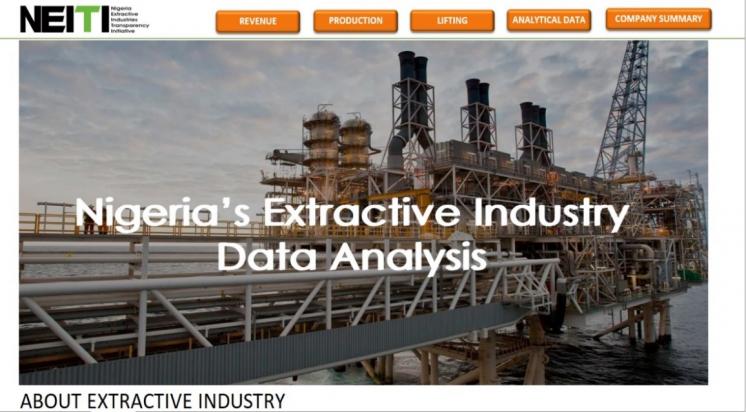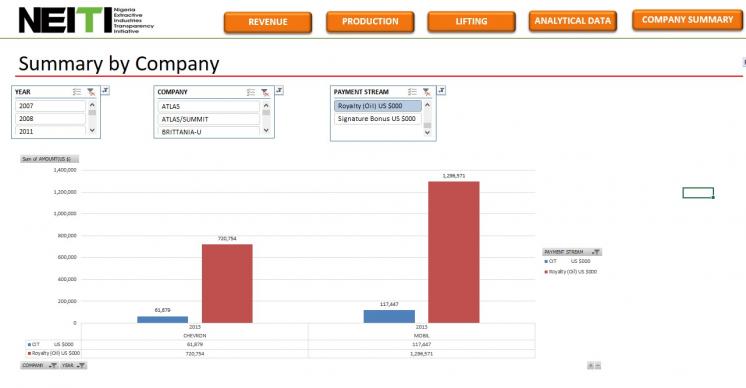
Faces of Transparency: Ayodeji Olowoporoku
Faces of Transparency: Ayodeji Olowoporoku
One on one with Ayodeji Olowoporoku, winner of the Executive Secretary Annual Award for Exceptional Contributions, Nigeria Extractive Industries Transparency Initiative
- Please give us a little bit of background of yourself; tell us who you are and why you are interested in extractives governance in Nigeria?
My name is Ayodeji Olowoporoku. I am a Policy Analyst at the Nigeria Extractive Industries Transparency Initiative (NEITI), and I have worked here since 2010. As an undergraduate, I studied Civil Engineering at the University of Ibadan in Nigeria. When I finished my degree, I felt the need to further improve in my educational capacity because I wanted to acquire the requisite knowledge that would enable me to contribute my part towards making Nigeria a better place. I soon realised that I couldn’t contribute to the change I wanted in Nigeria as an Engineer, so I pursued a post-graduate study in Economics before my masters in Development Economics at the University of Manchester. I’m currently pursuing a PHD in Policy Analysis.
During the time in the UK, I got a job at an insurance firm which was satisfactory at the time but my heart was with Nigeria and how I could contribute and make a difference. One day I saw an online advert for a position at NEITI which made me read up on NEITI and the EITI process. I realised the ideology of the EITI and NEITI mandate is to achieve transparency and accountability in the extractive sector which will lead to better governance in the extractive sector and ultimately contribute to the development of Nigeria. I knew just then that NEITI would be an avenue for me to contribute my quota. I applied for the job and the rest is history.
- For the first time, NEITI has handed out an award – the ES Annual Award for Exceptional Contributions – and you won it. Can you tell us about what you have just won and why you won it?
As you say, it’s the first award of its kind in NEITI. It’s an award created as a motivation by the new Executive Secretary, Waziri Adio for staff to think out of the box and go beyond the day-to-day tasks. The Executive Secretary early on shared his vision of what NEITI could be, in becoming the ‘power-house of knowledge’ in extractives. I realised that we needed innovative ideas to achieve this vision. I immediately saw where I could contribute. My ideas were always largely aligned with this vision, and he gave me the opportunity and support to work on these ideas. We ended up creating three distinct products as a result: a NEITI dashboard, a compliance ranking, and training modules for NEITI staff. Based on this, the management decided to create an award for exceptional contribution to NEITI’s overall objectives. The award is meant to motivate staff to go the extra mile – to go beyond the routine.

The front-page of NEITI’s prototype dashboard. After publication of their 2015 oil and gas report, this dashboard will be published online for all to use. NEITI also wishes to integrate the use of this data into its website itself.
The first thing was to start developing a dashboard – a repository for NEITI data. I realised that all the data from NEITI reports were in pdf format and were all within the audit report which makes it hard for users to easily access the data or conduct further analysis. The idea struck me that we could make the data from NEITI reports easily accessible and re-useable by all users. The whole line of thinking was to introduce a platform where information/data were easily accessible with graphical representation and where more analysis could be done. Making the information ready at your fingertips is the first step in facilitating analysis – trying to make information and data available for the everyone to use. That’s what started it. Also, even if you have information available, it doesn’t help to show people pages and pages of numbers. That’s just scary, it even scares me sometimes even though I’m at working with data.
The dashboard contains several sections, and is based on data from NEITI’s EITI Reports. It starts with Quick facts, which can show you the key revenue-figures for each NEITI Reporting year. At the click of a button you can easily see the exact information you want. This is the key tool for most users where anyone can access quick information about the sector. Under this section we also provide the possibility for time-series analysis, so you can see trends and changes.
After that, for those users that are interested in more information, we provide the same statistics and features for several other parameters, such as production, government’s share of production, exports, how much our national oil companies supply our refineries and oil/gas lifting.

After these sections, we introduce the Analytical function, which allows you to select multiple parameters, companies and years simultaneously. This is for our advanced users with specific questions. They would benefit from seeing multiple forms of information at a time. This is complemented by a Company summary section, which allows you to choose companies, years and revenue streams you wish to compare. As a second reason, we have previously had problems in getting timely information from some oil and gas companies in Nigeria. As a result, we came up with the idea to rank the companies and government agencies which report to NEITI. I immediately saw how I could contribute to this. Together with the team, we created a methodology based on the completeness and timeliness of the data, and created a Compliance report for 2015. This generated a ‘buzz’ amongst the companies and agencies. Suddenly companies started to become worried about not complying with requests for information. So rather than waiting for legislation and regulation to fix the lack of submissions, we started ranking them and put the results of that in the public space.
Finally, we recognised that more people should be able to do these analyses within NEITI, so we created training modules for NEITI staff. Here in NEITI we work a lot with data, therefore we need to be in a situation where everyone from an analyst to administrator should be able to talk about our data and analysis. This training has become weekly and hold every Monday.
- Future priorities: What does Nigeria need to do to further improve extractives governance? What are your top three priorities?
Wow that’s difficult. There are various things Nigeria can do to further improve extractive sector governance but if I had to choose the most important, my top three priorities would be;
- That recommendations from NEITI reports are implemented and followed through; that they are tracked. We are not just producing reports to comply with the EITI Standard but rather to ensure full Transparency and Accountability in the extractive sector. We need to find ways to inspire political will and make sure that the challenges leading to the recommendations become a thing of the past.
- Large-scale reform. it is wonderful that the government is working on the PIGB [Petroleum Industry Governance Bill], but we must urgently reform our fiscal regime for oil and gas sector.
- I want to bring it down to more specific issues; Beneficial Ownership and Contract Disclosure. We need to know “who owns what”, alongside what they owe Nigerians in return. I believe this will go a long way in solving much larger problems.
- What plans do you have next? What is NEITI currently doing?
Based on our success with the ranking of companies and governments, we are putting together a wider index for the extractive sector – as it relates to NEITI. We will include companies and government agencies in this index. We want to create an index such as Transparency International Index for the Nigerian extractive sector, including mining. We are also working on migrating historical data from the NEITI Solid minerals and Fiscal Allocation and Statutory Disbursement reports to the data dashboard. We want NEITI to be a repository of data for the Nigerian Extractive sector. We are prepared for an exciting future of Nigeria’s extractive sector.
This EITI profile is from Nigeria Extractive Industries Transparency Initiative. Nigeria is one of the original implementing countries of the EITI, and has produced reports covering the oil, gas, and mining sector for more than 15 years (1999-2015). For more information about EITI in Nigeria, see https://eiti.org/Nigeria
Related content



Statement from the EITI Board Chair on the continued detention of Mr. Gubad Ibadoghlu
